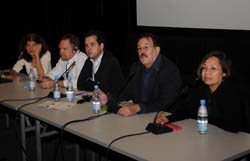The power of film critics
Santo Domingo, November 23, 2008
 |
|
Julie Salamon, John Anderson,
Iván Pinto, Arturo Rodríguez,
Anna Marie de la Fuente |
"A film review should be a conversation that involves the readers, something that people want to read,” was the main conclusion determined at this Sunday’s panel “Art and the power of the film critic.” Americans Julie Salamon, John Anderson and Anna Marie de la Fuente; Chilean Iván Pinto and Dominican Arturo Rodríguez participated in the II International Dominican Film Festival to debate the main features and elements of film criticism.
In a friendly setting, which lent itself to a great conversation with the public present, these experienced film critics from various backgrounds shared their opinions and point of views on the reviews of films that are currently being made.
“The critic cannot be dictatorial. My function as a critic is not to tell people whether a film is good or bad, but to give information on value,” assures journalist John Anderson, film critic for the Washington Post, Variety and Newsday. Anderson says that the critic is also part of the arts, and as such, needs to respond to certain criteria in the artistic process.
Arturo Rodriguez, who has been a Dominican film critic for more than 40 years, said that film reviews are completely subjective evaluations that should offer the audience extra information about the film, with the intention of educating the audience. “You cannot write a review if you do not know what you are talking about. A review takes into account the music, cinematography, the script, the acting, to place the reader/viewer in an historical, social and literary context,” explains Rodriguez.
In agreement with Rodriguez, Julie Salamon affirmed that film criticism is a type of subjective writing based on a critical analysis of the elements that make up a feature-length film and the final effect caused by the film on the public. “Since films influence in different ways, through the music or the story, and each critic may identify with one,” explains the reporter and writer.
The subject of the growing number of blogs and websites dedicated to the practice of film criticism led to a broad discussion among all the participants. “The Internet can be a tool to connect common perspectives from different places,” said Ivan Pinto, a young filmmaker who directs an online film criticism magazine.
From a journalist’s perspective, Anna Marie de la Fuente expressed that her main function is to determine whether a story is worthy or not of appearing in the medium in which she works. “The publicists want you to sell the films as if they were good stories, but many are not. You have to look for stories that interest those who live in Hollywood, and beyond that, that can have international importance,” assures the chief editor of Variety magazine for Latin America.
The panelists assured that critics are formed through seeing and reading and that, in addition, they tend to have a special inclination for the arts, which is what motivates them to express judgment on what they see. Personally, Anderson said that each film should create its own universe, “its own world,” and if a viewer can enter that world, then the film succeeds.
In the debate, Pinto suggested a good way to motivate critics would be to hold film criticisms before an audience to share experiences and opinions. The audience attending this panel included renowned figures from the Dominican film scene, including critics and actors, as well as international participants.
|








